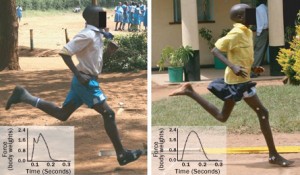Physics of running bared
Running without shoes softens the blow
To complete a recent study, a team of scientists left Boston and went halfway around the world, to the middle of Kenya. They wanted to find out more about barefoot running.
Sure, people can run barefoot anywhere. But the Rift Valley Province in Kenya has produced some of the most famous long-distance runners in history, and many of these athletes grew up not wearing shoes. With a video camera in hand, scientist Daniel Lieberman and his colleagues visited some of these runners to figure out what a difference shoes make.

“One shouldn’t be scared of barefoot or minimal shoe running or think it odd,” Lieberman told Science News. “From an evolutionary perspective, it’s normal and, if done properly, it is very fun and comfortable. We evolved to run barefoot.”
Lieberman is an evolutionary biologist at Harvard University. An evolutionary biologist is a scientist who studies the way living creatures have changed over long periods of time. With his research, Lieberman wants to know why and how the human body works the way it does.
Previous studies have shown that when a person runs barefoot, she lands on the fronts or middles of the feet. Then the heel goes down. During this process, the weight of the body is at first on the front of the feet, then moves to the heel. Lieberman and his colleagues saw this motion firsthand in Kenya — the runners landed on the fronts of their feet.
When a person wears shoes, however, he tends to run so that his heels hit the ground first. The impact of the heel hitting the ground may be much more forceful than the impact of the front of the foot hitting the ground.
In the 1970s, shoe companies began selling running shoes that had cushioned soles. Those soles distributed the body weight through the foot and may have influenced the way people ran. Once runners started wearing these shoes, they could land on their heels and still be comfortable.
The researchers also studied barefoot runners in their laboratory in Boston. The goal was to measure the force with which a runner’s foot hits the ground. Force is calculated by multiplying the mass of an object — such as a human body — with its acceleration. By studying this force, the scientists could compare the impact of different running styles.
“A rear-foot strike is like someone hitting you on the foot with a hammer with about one and a half to three times your body weight. It would hurt without a shoe,” Lieberman told Science News. “A forefoot strike is like having no one hit you at all.”
Daniel Schmitt is an evolutionary anthropologist at Duke University. He told Science News that the new study by Lieberman and his colleagues is “really elegant and well done,” and that the finding is a clear, good example of the science behind different running styles.
Lieberman’s study explores the physics of running, which is a complex topic. Reed Ferber is a biochemist at the University of Calgary in Canada. The idea that barefoot running is better “is a massive assumption,” he told Science News. “Fundamentally, there are no studies out there that show barefoot running is less injurious.” In other words, don’t throw out those fancy running shoes just yet.
POWER WORDS (adapted from Yahoo! Kids Dictionary)
biological evolution The process of physical change in living things across generations.
biology The science of life and of living organisms, including their structure, function, growth, origin, evolution and distribution.
biochemistry The study of the chemical substances and vital processes occurring in living organisms.
force The capacity to do work or cause physical change.







